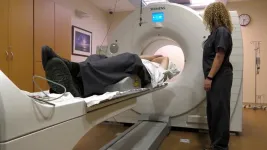(Press-News.org) Vienna, Austria- 31 March 2025
New research presented at the EHRA 2025, a scientific congress of the European Society of Cardiology, shows that the presence of atrial fibrillation (AF) increases the risk of future dementia by 21% in patients diagnosed with AF under 70 and the risk of early-onset dementia (diagnosed before age 65 years) by 36%. The association was stronger in younger adults and was lost in older adults aged 70 years and over.
“This is the largest European population-based study evaluating the association between AF and dementia,” say the authors that include Dr Julián Rodriguez García of the Electrophysiology and Arrhythmia department of the Bellvitge University Hospital, Barcelona, Spain. “The association between AF and dementia was stronger in patients under 70 and was maximal for early-onset dementia.”
Atrial fibrillation causes an irregular heartbeat and is relatively common, affecting 2-3% of the general population, with the prevalence rising with age.
Some studies have suggested an independent association between AF and dementia, while others have failed to confirm this relationship. The strength of this association, as well as its interaction with stroke, remain controversial. “Identifying subgroups with the strongest association can help understand the drivers of this association and inform targeted preventive interventions,” explain the authors.
In this new study, the researchers assessed the independent association between AF and incident dementia in Catalonia, Spain. The population-based observational study included individuals who, in 2007, were at least 45 years old and had no prior diagnosis of dementia. The population was sourced from the System for the Development of Research in Primary Care, which provides anonymised data on over 80% of the Catalan population.
Incident dementia cases were defined using a validated approach based on International Classification of Disease 10 (ICD10) codes and prescription data for dementia-related medications. Early-onset dementia (EOD) was defined as a diagnosis occurring before age 65. The follow-up period extended over 15 years, from 2007 to 2021.
The study included 2,520,839 individuals with an average follow-up of 13 years. At baseline, 79,820 patients (3.25%) had a recorded diagnosis of AF. In multivariable analyses adjusting for potential confounders, AF was, overall, a statistically significant but weak predictor of dementia, linked with a 4% increased risk of dementia.
However, age was found to significantly affect the association between AF and dementia. In prespecified analyses stratified by age, the strength of the association progressively weakened with increasing age: in patients aged 45-50, those with AF were 3.3 times more likely to develop dementia than those without AF. But in patients aged over 70 years, no association was found.
Further analysis shows the association lost statistical significance from 70 years. By contrast, in patients diagnosed with AF before the age of 70, the condition independently increased the risk of dementia by 21%, and an even stronger effect was observed for early-onset dementia, with AF increasing the risk by 36%.
Reflecting on the potential causes of the association, the authors say: “Dementia is often a multifactorial condition with mixed neuropathological findings rather than a single pathophysiological process. This may explain why AF has a greater impact in younger patients, where it could be one of the primary pathogenic factors. Conversely, in older individuals, additional contributors to cognitive decline—such as age-related neurodegeneration—may lessen the relative impact of AF.”
Sensitivity analyses that removed cases of previous stroke during follow-up yielded similar results: AF was associated with a modest increase (6%) in the risk of dementia in the overall population, a stronger association (23% increased risk) in those diagnosed with AF in midlife (<70 years old) and had the greatest effect towards early-onset dementia (52% increased risk). Therefore, patients with AF without a prior stroke still have a higher risk of dementia, with the greatest risk observed in early-onset dementia.
The authors say: “Atrial fibrillation is a risk factor for stroke and stroke is a risk factor for dementia. However, the observation that the association between AF and dementia remains unchanged after excluding patients with prior stroke indicates that other mechanisms must be involved in the increased risk of dementia among AF patients. These mechanisms may include silent strokes – meaning those that showed no clinical symptoms and can only diagnosed with CT scan or MRI – and also microinfarcts, and microbleeds.”
Regarding additional potential mechanisms connecting AF and dementia, the authors say: “Haemodynamic changes, which involve alterations in the flow and pressure of blood in the body caused by AF, and autonomic dysregulation, which refers to an imbalance in how the body controls automatic functions like heart rate, breathing, or blood pressure, could also play a role in the disease of small blood vessels in the brain associated with dementia. Additionally, systemic inflammation associated with atrial fibrillation may amplify these effects, creating a synergistic pathway that further increases dementia risk.”
Overall, they conclude: “The study demonstrates a significant and strong association in younger patients between two pathologies – atrial fibrillation and dementia - that are among the major health challenges of the 21st century. We should now investigate whether early detection strategies and aggressive management of atrial fibrillation in younger patients can help reducing the risk of dementia and changing the natural course of the disease.”
ENDS
Funding – This study was funded with a restricted grant by Bayer.
Disclosures – The authors confirm no conflicts of interest
ESC Press Office
Tel: +33 6 61 40 18 84
Email: press@escardio.org
Follow us on X @ESCardioNews
About the European Society of Cardiology
The ESC brings together health care professionals from more than 150 countries, working to advance cardiovascular medicine and help people to live longer, healthier lives.
About the European Heart Rhythm Association
EHRA aims to improve the quality of life and reducing sudden cardiac death by limiting the impact of heart rhythm disturbances.
About EHRA 2025 #EHRA2025
Information for journalists about registration for EHRA 2025:
EHRA 2025 takes place from Sunday, March 30, to Tuesday, April 1 at Messe Wien, Messeplatz 1, 1020 Vienna, Austria. Explore the scientific programme
Free registration applies to accredited press.
Credentials: A valid press card or appropriate letter of assignment with proof of three recent published articles. Read the ESC media and embargo policy.
The ESC Press Office will verify the documents and confirm by email that your press accreditation is valid.
The ESC Press Office decision is final regarding all press registration requests.
END
Atrial fibrillation diagnosed in midlife is linked to a 21% increased risk of dementia at any age and a 36% higher risk of early-onset dementia
2025-03-30
ELSE PRESS RELEASES FROM THIS DATE:
Mode of death in patients with heart failure with mildly reduced or preserved ejection fraction
2025-03-30
About The Study: Among patients with heart failure with mildly reduced ejection fraction/heart failure with preserved ejection fraction in the Finerenone Trial to Investigate Efficacy and Safety Superior to Placebo in Patients With Heart Failure randomized clinical trial, higher proportions of cardiovascular and overall mortality in those with ejection fraction less than 50% were related principally to higher proportions of sudden death. A clear treatment effect of finerenone on cardiovascular or cause-specific mortality was not identified, although the trial was likely underpowered for these outcomes.
Corresponding Author: To contact the corresponding author, Akshay S. Desai, ...
Intravenous ferric carboxymaltose in heart failure with iron deficiency
2025-03-30
About The Study: In patients with heart failure and iron deficiency, ferric carboxymaltose did not significantly reduce the time to first heart failure hospitalization or cardiovascular death in the overall cohort or in patients with a transferrin saturation less than 20%, or reduce the total number of heart failure hospitalizations vs placebo.
Corresponding Author: To contact the corresponding author, Stefan D. Anker, MD, PhD, email s.anker@cachexia.de.
To access the embargoed study: Visit our For The Media website at this link https://media.jamanetwork.com/
(doi:10.1001/jama.2025.3833)
Editor’s ...
Artificial intelligence in the prevention of sudden death
2025-03-30
Many cases of sudden cardiac death could be avoided thanks to artificial intelligence. As part of a new study to be published in European Heart Journal, a network of artificial neurons imitating the human brain was developed by researchers from Inserm, Paris Cité University and the Paris public hospitals group (AP-HP), in collaboration with their colleagues in the USA. During the analysis of data from over 240 000 ambulatory electrocardiograms, this algorithm identified patients at risk of a serious arrhythmia that was capable of triggering cardiac arrest within the following 2 weeks in over 70% of cases.
Each ...
Oral semaglutide vastly reduces heart attacks, strokes in people with type 2 diabetes
2025-03-29
Both the injectable and oral forms of semaglutide, a glucagon-like peptide-1 receptor agonist, have gained recent attention for their effectiveness against weight gain, high blood sugar, and even alcohol cravings.
A new clinical trial, co-led by endocrinologist and diabetes expert John Buse, MD, PhD, and interventional cardiologist Matthew Cavender, MD, MPH, at the UNC School of Medicine has shown that the oral form of semaglutide can significantly reduce cardiovascular events in people with type 2 diabetes, atherosclerotic cardiovascular disease, and/or ...
Prothrombin complex concentrate vs frozen plasma for coagulopathic bleeding in cardiac surgery
2025-03-29
About The Study: In this unblinded randomized clinical trial, prothrombin complex concentrate had superior hemostatic efficacy and safety advantages to frozen plasma among patients requiring coagulation factor replacement for bleeding during cardiac surgery.
Corresponding Author: To contact the corresponding author, Keyvan Karkouti, MD, email keyvan.karkouti@uhn.ca.
To access the embargoed study: Visit our For The Media website at this link https://media.jamanetwork.com/
(doi:10.1001/jama.2025.3501)
Editor’s Note: Please see the article for additional information, including other authors, author contributions and affiliations, ...
Who needs a statin? New study compares prescribing recommendations based on traditional risk factors vs. coronary artery calcium scoring
2025-03-29
A new study by researchers at Intermountain Health in Salt Lake City aims to determine the best method to screen and evaluate patients who are at risk of developing coronary heart disease and which patients would benefit from taking a statin medication to lower cholesterol.
Currently, cardiologists determine a patient’s need for a statin based on traditional risk factors, using the Pooled Cohort Equation (PCE), which calculates coronary risk by assessing the risk factors of age, sex, total and HDL cholesterol levels, blood pressure, and whether someone ...
Finerenone and atrial fibrillation in heart failure
2025-03-29
About The Study: The efficacy of finerenone was consistent regardless of atrial fibrillation status in this study. New-onset atrial fibrillation was associated with a substantially higher risk of subsequent outcomes.
Corresponding Author: To contact the corresponding author, John J. V. McMurray, MD, email john.mcmurray@glasgow.ac.uk.
To access the embargoed study: Visit our For The Media website at this link https://media.jamanetwork.com/
(doi:10.1001/jamacardio.2025.0848)
Editor’s Note: Please see the article for additional information, including other authors, ...
Low coronary artery calcium score is associated with an excellent prognosis regardless of a person’s age, new study finds
2025-03-29
Having a coronary artery calcium (CAC) score of zero has generally been accepted as a marker of a very low risk of having a cardiac event within the next five years. However, age is a strong contributor to coronary risk, with risk increasing markedly as people age.
Whether age-related risk factors diminish the low risk predicted by a zero coronary artery calcium score has been uncertain – until now.
A large new study of more than 40,000 patients from heart researchers at Intermountain Health in Salt Lake City finds that a zero coronary artery calcium score continues to be an accurate indicator of a low risk for a coronary ...
Groundbreaking consensus statement on conduction system pacing released: a major milestone in the evolution of pacing therapy
2025-03-29
Vienna, 30 March 2025– The European Society of Cardiology (ESC) has released a groundbreaking consensus statement on conduction system pacing (CSP), marking a significant milestone in the evolution of pacing therapy. The document was officially presented today at the EHRA 2025 congress in Vienna and simultaneously published in EP Europace.
For over 50 years, right ventricular pacing has been a standard treatment for slow heart rhythms. However, in some patients, this approach can lead to reduced heart function and even heart failure. Furthermore, biventricular pacing ...
Nuclear monitoring system suggests landslide cut off internet in west Africa
2025-03-29
Hydroacoustic signals captured by the world’s international nuclear monitoring system suggest an underwater landslide may have broken communications cables and disrupted internet traffic in west African countries for several weeks in March 2024.
Researchers used data collected by hydrophones installed by the International Monitoring System of the Comprehensive Nuclear-Test-Ban Treaty Organization (CTBTO) to determine the location of the possible landslide, placing it along the steep slopes of Trou Sans Fond Canyon offshore of Ivory Coast.
The proposed landslide corresponds with the timing and location of four broken cables in the canyon, according to Vaibhav Vijay Ingale of UC ...


